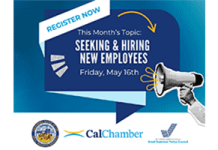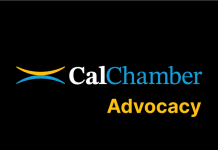In this episode of The Workplace podcast, CalChamber employment law expert Matthew Roberts and best-selling author and recruiting expert Rikka Brandon discuss hiring best practices in a post-COVID-19 pandemic job landscape.
Today’s job landscape is unrecognizable for many HR professionals, and Brandon, founder and CEO of Building Gurus, thinks we are only going to continue to see more rapid change.
Smaller Workforce Pool, Retirement Wave
The birth rate in the U.S. has been dropping since 1958, going from 25 births per year down to 12. Because of this, our workforce is much smaller and there are not as many people entering it. Meanwhile, the youngest baby boomers are now 58, leaving many companies in a danger zone of unexpected or early retirements, Brandon points out. On top of this, the job growth rate has exploded, and we now have 5 million more jobs than people.
These reasons, Brandon says, is why it’s so competitive right now to find, hire and keep employees. And it doesn’t look like it’s going to get better in the future. In the next 10 years, it’s expected that 10 million more jobs will be created.
“So, unless something drastically different happens with immigration or something, we’re going to be very short of people to work in the jobs,” she tells Roberts.
Delayed Wages Are Catching Up
Brandon says that the companies and clients she has consulted with have had to increase their wages anywhere from 5% on the low end, to 25%.
One explanation for the wage gains we saw during the COVID-19 pandemic, she says, is that wages in the U.S. were actually behind. These delayed wage gains caught up to the current market during the pandemic, hitting companies with a double whammy of higher wages and COVID-19 restrictions.
Recruiting Best Practices
So how can companies attract the most qualified candidates in this new environment?
Brandon says there are two ways to get great candidates: one is attraction, and one is recruiting.
Attraction is posting a job ad, asking for referrals, and maybe creating a relationship with a local school. This is what most businesses do.
Then, there’s recruiting, which is more like sales. With recruiting, companies hire headhunters who identify people with desired skills.
For most businesses, they will just need to do the attraction piece really well and it will solve their problems. When focusing on attraction, employers need to make sure their brand is good so that when prospective applicants check Yelp, Glassdoor or LinkedIn, they can see how great the company is to work for.
“The ticket that is going to change your results is you have to start selling your opportunity, and your organization,” she says.
For years, employers have just been telling, but to stand out, employers need to start selling their organization.
When hiring, employers should leave stereotypes at the door and realize that for some people, money is a big motivator, while others are focused on altruistic things and want the work that they do to have meaning. So it’s important that employers handle candidates one-on-one and determine what they can offer that candidate and how they can customize the job description and get creative with it, Brandon says.
With that said, Brandon stresses that money will always matter. A candidate will not take a pay cut to work for you unless you are unbelievably tied to their passion project.
Likewise, benefits matter to people.
“If you don’t have health insurance, and [the job candidate has] somebody in their family that has a chronic illness, it is almost impossible for them to make that choice,” Brandon says.
These two components are very important, she stresses.
Importance of Job Description
When writing a job description, it’s important for employers to be clear about a particular position. Why does the business need this position? Why is it worth the time, energy and money to pay the payroll and train this person? After answering these questions, Brandon says, the employer may proceed to write the job description.
Having an accurate job description that details what the job really includes, like the challenges and opportunities within it, helps the interview and selection process because candidates will be able to determine during the interview whether they choose to opt in or opt out. This saves an employer time and money versus training and paying for a new employee who then decides to quit 90 days later, Brandon points out.
Be Upfront About Drug, Background Testing
Some employers have expressed concern that their drug or background test policies might scare off applicants, Roberts says. Should employers be transparent in their recruiting copy or save the information for the interview process?
Brandon answers that if passing a drug test is non-negotiable, then the company should not waste their time and be upfront about the requirements in the job ad.
“At the end of the day, you don’t actually want people that can’t pass the drug test. So why are we trying to get them into our funnel? Let them just scroll on by to the next one that doesn’t have that requirement,” she says.
Assess Your Recruiting Success
Brandon closes the podcast by encouraging employers to take a self-assessment of how their recruiting efforts fared in the last year. Did you get many applications for your job posting? Did you lose people during the interview process? Perhaps you were a little slower than you should have been?
“Most people don’t realize that there’s about nine decisions that a job seeker has to make to choose to apply to your job posting,” Brandon says.
It’s easy for an employer to think that there just isn’t anyone good out there, but Brandon urges employers to stop thinking this way and consider what they are doing. They are likely not selling the company enough. The employer should get into Millennial or Gen Z’s shoes to figure out how the company can adapt and market itself better.
Brandon stresses that an employer is not going to get a different result if they don’t get educated on what’s not working.
Lastly, if an employer is not having success, they can hire a consultant. Sometimes an employer may have more money than time, so they can hire an expert to figure it all out for them.
“Really understand that the game is changing. It’s harder, and you’re going to have to try harder, and you need to know how to get a different result to actually get one,” Brandon says.


